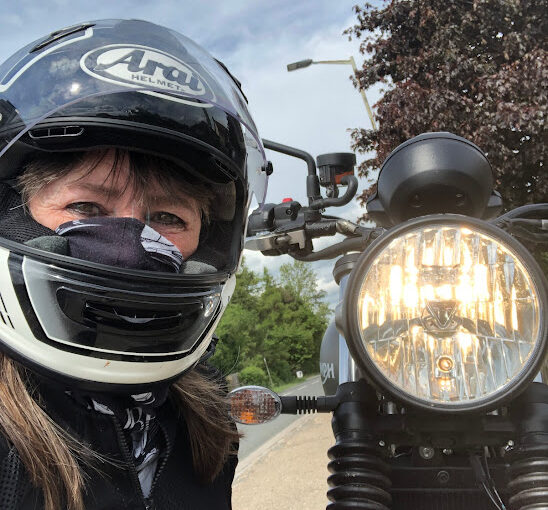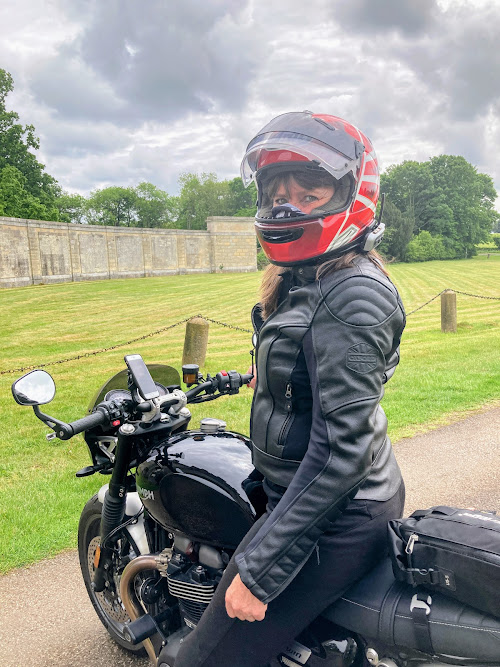
I met my IAM observer, Ian Souter, for my third observed ride at Woburn Triumph. Thankfully when I arrived there the sun was shining but I had ridden through a thunderstorm with some hailstones thrown in along the way so I was hoping the sun would dry me out a little!
I had absolutely no nerves today, I think I’ve really settled into the course now. I think it’s great that I have Ian each week for my observed rides, the continuity helps to keep me relaxed and we have a general chit chat before we start which is great, we don’t just launch into the session.
Ian explained what we would be doing this session and what I should expect. Today we would be covering the Gear part of the syllabus. The system at the core of advanced riding is known as IPSGA : Information, Position, Speed, Gear and Acceleration.
The IAM describe the Gear part as ‘Accurate use of the gears allows an engine to deliver the required performance in all situations’.
Before we set off Ian asked me if I could remember what the POWDERY acronym was which we touched on last week.
Petrol: have I got enough;
Oil: have I checked the oil, does it need topping up;
Water: have I checked the water, does it need topping up;
Damage: check over the bike to make sure there is no damage that would cause an obstruction / be a hazard to riding;
Electrics: are the brakes, lights etc working;
Rubber: are my tyres okay, enough tread etc.;
Yourself: am I in a fit state to ride.
I couldn’t remember what the D and R was for. Homework for this week is to embed this into my memory!
Ian also asked what the I in IPSGA was and thankfully I got that right – phew!! It’s good to know that I am retaining a lot of the information that I am learning. The more I put into practice what I am learning, the easier it will be to remember and it then for it to just become second nature.
So, today’s session is Gears. We would be doing a couple of exercises that Ian learnt when he attended the California Bike School a few years back with his instructor, Andy Ibbott. The idea is that I will be thinking about what gear I am in and understand throttle sense.
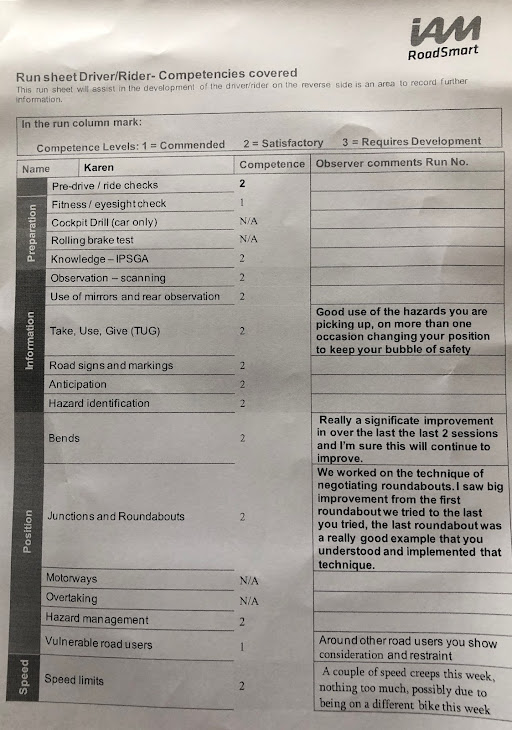
We would be riding for about 15/20 minutes to a stretch of road that had quite a few bends and a couple of hairpins thrown in too but I was to stay in third gear and not use the brakes. Of course if braking was needed or I felt unhappy with a bend at the speed I was going then to use the brakes. It’s only an exercise just to make me think about gears and when to come off/put on the throttle.
Okay, I can do this. Off we set and within about fifty yards was the first hairpin. That caught me out straightaway and I braked. Darn it. I could tell that I was riding a lot slower than I would normally be but I really didn’t want to use the brakes. The second hairpin caught me out too as did a couple of the other tighter bends. Although I was doing a lot of engine braking, sometimes this was just not enough braking for the corner.
We parked up and Ian asked me what I thought about that exercise – it was really making me think about engine braking and controlling the bike at the appropriate speed and gear for the corner. I found it really interesting. Onto the next exercise.
We would be going back along the same stretch of road but this time in second gear without using the brakes but, again, if I felt unhappy with a bend and felt the need to use the brakes, then to do so.
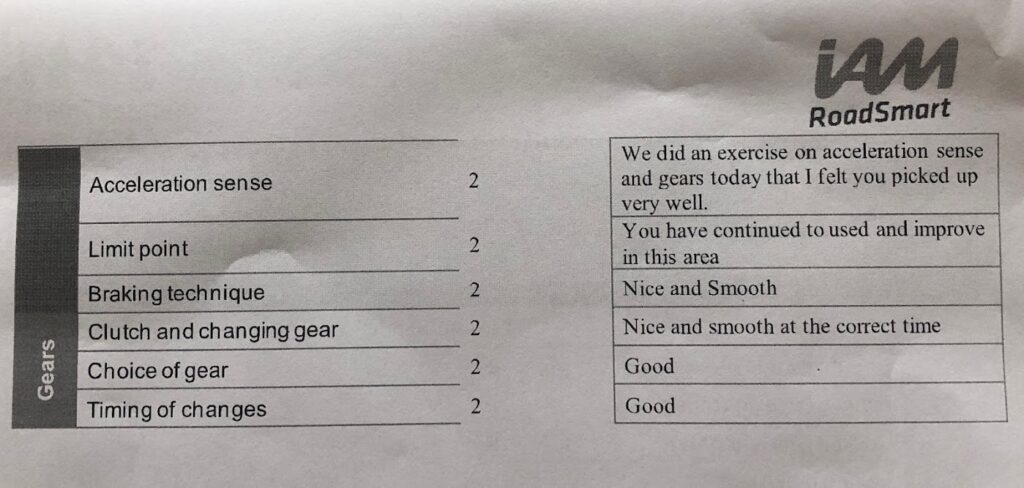
It was way better doing this exercise in second gear, I didn’t use the brakes at all, even on the hairpins. When we got to the end and parked up, Ian said that I had been going 10-15 mph quicker along the straights and 5-6 mph quicker in the bends. I definitely felt I had way more control of the bike and could set myself up for the corners better.
Doing this exercise was making me think about the appropriate gear I should be in for the road I was on, what was coming up ahead and when I should be changing up/down or speeding up/slowing down. I really enjoyed that
So the next part of the session we were heading into Milton Keynes where there are an awful lot of roundabouts (about 130 of them) and Ian would be looking to see that I am competent at these (one part of course that I am assessed on).
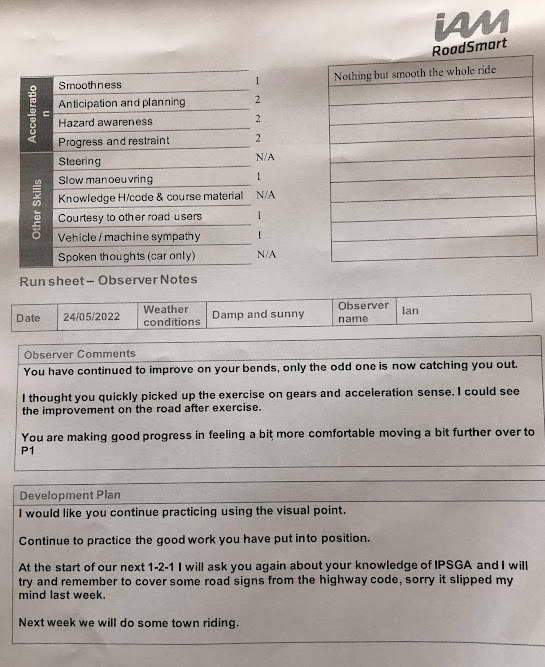
I should be competent at identifying the junction system I am dealing with (in this case the roundabout) and monitoring my speed and distance on approach; assessing the speed and position of other road users; identifying hazards and preparing for situations that may arise; the best position to enter, negotiate and leave the junction; checking mirrors and/or blind spots; adopting the appropriate positions; adjust speed in relation to the physical features of the junction and traffic flow; select and engage appropriate gear for the speed and circumstances; applying appropriate timely acceleration to leave the hazard (the roundabout) !
When you see it written down like that, it really makes you think just how much information you are processing and taking in whilst riding/driving and that you do all this as a matter of course. It’s really good to take a step back and think about why/what you are doing and to make sure that you are doing all that you can to keep yourself and other road users as safe as possible.
Ian said that on approaching roundabouts I should, if it was safe to do so, take the apex of the roundabout rather than riding around the roundabout which is what I normally tend to do. We went over several roundabouts with Ian observing me and after we parked up Ian said I had this spot on which I was well chuffed about. It’s always good to get reassurance that you’re doing things right.
I’m looking forward to the next observed session where I’m told we will be putting into practice what I have learnt over the last few weeks and will be riding most of the session
BK

